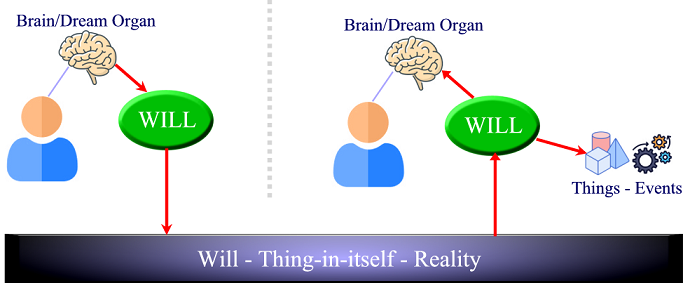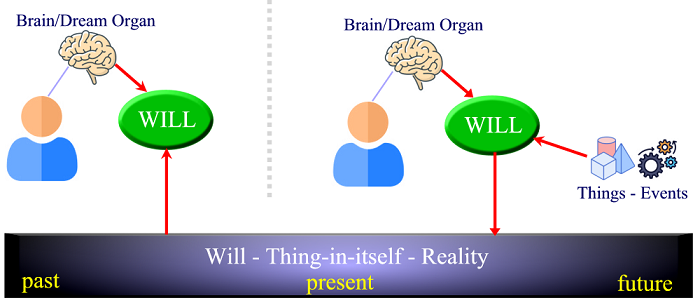
This blog discusses ideas and concepts that I am currently thinking about for my book on Hyponoetics as an integral philosophy of mind and matter.
Schopenhauer’s Theory of Psychic Phenomena
It is not well known that Schopenhauer proposed an explanation of psychic phenomena, such as clairvoyance, ESP and telepathy, based on his metaphysics of will. His open-mindedness and intention to embrace not only scientific and physical phenomena of the world but also address mental phenomena that do not fit into academic science but have a long history in human experience since the dawn of humankind, are remarkable.
Today, there is overwhelming scientific evidence that certain psychic phenomena are real and are not inconsistent with modern science, especially quantum physics. I will discuss Schopenhauer’s theory first and then mention a few modern theories and compare them with Schopenhauer’s theory.
He writes in his book Über den Willen in der Natur (On the Will in Nature):
Sehn wir nun also den Willen, welchen ich als das Ding an sich, das allein Reale in allem Dasein, den Kern der Natur, aufgestellt habe, vom menschlichen Individuo aus, im animalischen Magnetismus, und darüber hinaus, Dinge verrichten, welche nach der Kausalverbindung, d.h. dem Gesetz des Naturlaufs, nicht zu erklären sind, ja, dieses Gesetz gewissermassen aufheben und wirkliche actio in distans ausüben, mithin eine übernatürliche, d.i. metaphysische Herrschaft über die Natur an den Tag legen; - so wüsste ich nicht, welche tatsächlichere Bestätigung meiner Lehre noch zu verlangen bliebe.
[Julius Frauenstädt: Arthur Schopenhauer – Sämtliche Werke, Band 4, Über den Willen in der Natur, p.104](We will see will—which I have presented as the thing in itself, as the only real thing in all existence, as the core of nature— achieving through the human individual things not to be explained by causal connection, i.e., by the law of the course of nature, indeed, things that to a certain extent suspend this law and actually exert action at a distance, thus revealing a supernatural, i.e., metaphysical mastery of nature —then I know of no more factual corroboration of my theory that could still be required.)
He called psychic phenomena ‘practical metaphysics’ or ‘empirical or experimental metaphysics’. Like science, psychic phenomena corroborate his metaphysics of will by drawing from extraordinary human experience or altered states of consciousness. He recognizes that psychic phenomena depend on a form of interconnection between beings and that space is no obstacle for the will to act at a distance.
Schopenhauer’s possible explanation of psychic phenomena is rather straightforward within his framework of the metaphysics of will.
Allein die dabei gemachte Voraussetzung war, dass es ausser der äussern, den nexum physicum begründenden Verbindung zwischen den Erscheinungen dieser Welt, noch eine andere, durch das Wesen an sich aller Dinge gehende, geben müsse, gleichsam eine unterirdische Verbindung, vermöge welcher, von einem Punkt der Erscheinung aus, unmittelbar auf jeden andern gewirkt werden könne, durch einen nexum metaphysicum; dass demnach ein Wirken auf die Dinge von innen, statt des gewöhnlichen von aussen, ein Wirken der Erscheinung auf die Erscheinung, vermöge des Wesens an sich, welches in allen Erscheinungen Eines und das selbe ist, möglich sein müsse; dass, wie wir kausal als natura naturata wirken, wir auch wohl eines Wirkens als natura naturans fähig sein und für den Augenblick den Mikrokosmos als Makrokosmos geltend machen könnten; dass die Scheidewände der Individuation und Sonderung, so fest sie auch seien, doch gelegentlich eine Kommunikation, gleichsam hinter den Kulissen, oder wie ein heimliches Spielen unterm Tisch, zulassen könnten...
[Julius Frauenstädt: Arthur Schopenhauer – Sämtliche Werke, Band 4, Über den Willen in der Natur, p.111](The presupposition was, that besides the external connection grounding the nexus physicum between the appearances of this world, there must be still another [connection], proceeding through the essence in itself of all things, a subterranean connection, so to speak, whereby one point of appearance would be able immediately to affect any other by a nexus metaphysicum; that therefore it must be possible to affect things from within, instead of from without as is usual, an effect of appearance on appearance, by means of the essence in itself that is one and the same in all appearances; that, just as we act causally as created nature, we would also be capable of acting as creating nature, and for the moment the microcosm would assert itself as macrocosm; that the partitions of individuation and separation, no matter how firm, could still occasionally permit a communication, as it were, behind the curtains, or like a secret game under that table.)
With phenomena of actio in distans, the isolation of the individual will within consciousness is removed and the will becomes omnipotent and can act at a distance without a physical medium. Similarly, with phenomena of visio in distans or passio a distante, the isolation of cognition is removed, and the mind becomes omniscient and can know things that have never been acquired by the mind through the regular channels of perception or learning.
…dass das Ding an sich, also das allein wahrhaft Reale in allen Erscheinungen, als frei von jenen beiden Formen des Intellekts [Zeit und Raum], den Unterschied von Nähe und Ferne, von Gegenwart, Vergangenheit und Zukunft nicht kennt; daher sich die auf jenen Anschauungsformen beruhenden Trennungen sich nicht als absolute erweisen, sondern für... die Erkenntnisweise keine unübersteigbare Schranken mehr darbieten.
[Julius Frauenstädt: Arthur Schopenhauer – Sämtliche Werke, Band 5, Parerga und Paralipomena, Erster Band, p.280](...that the thing in itself, that is, the sole truly Real in all appearances, as free from both those forms of the intellect [time and space], does not know the difference between proximity and distance, between presence, past and future; therefore, separations based on these forms of intuition are not absolute, but are no longer impassable obstacles for this mode of cognition.)
Psychic phenomena, according to Schopenhauer, corroborate the Kantian theory of the ideality of time, space and causality. These are forms of our perception and not of reality itself. Therefore, when we extend our mind and will beyond the individual mind and will, we operate on the level of reality itself, which is not subject to time, space and causality:
...dass das Kausalitätsgesetz bloss das Band der Erscheinungen sei, das Wesen an sich der Dinge aber davon unabhängig bleibe, und dass, wenn von diesem aus, also von innen, ein unmittelbares Wirken auf die Natur möglich sei, ein solches nur durch den Willen selbst vollzogen werden könne.
[Julius Frauenstädt: Arthur Schopenhauer – Sämtliche Werke, Band 4, Über den Willen in der Natur, p.126](...that the law of causality is only the connection of the phenomena, but the essence of things remains independent of it, and that, if from this essence, that is, from within, an immediate effect on nature is possible, this could only be performed through the will itself.)
Our individual will is a manifestation of the universal will that is the essence of everything. Therefore, our will can connect us with the universal will, or the underlying reality, in a direct way, which would allow us to mentally have an effect on things at a distance or receive information about things anywhere and anytime, and therefore overcome the constraints of time, space and causality.
The faculty of the mind capable of extrasensory perception is called by Schopenhauer ‘dream organ’ [Traumorgan], for the lack of a better term. It’s what I call Paranoesis or the cognitive direct access to any information regardless of time and location.
Das Gemeinsame derselben [Traum, somnambules Wahrnehmen, Hellsehn, Vision, Zweites Gesicht, u.a.] ist, dass wir... eine sich objektive darstellende Anschauung durch ein ganz anderes Organ, als im gewöhnlichen wachen Zustande, erhalten; nämlich nicht durch die äussern Sinne...: ich habe solches demnach das Traumorgan genannt.
[Julius Frauenstädt: Arthur Schopenhauer – Sämtliche Werke, Band 5, Parerga und Paralipomena, Erster Band, p.289](What is common to those [dream, somnambulist perception, clairvoyance, vision, second sight, etc.] is, that we…receive an objectively represented intuition through an organ completely different from the one in the ordinary state of wakefulness; namely, not through the external senses…: I have called this accordingly the dream organ.)
In the following diagrams, I visualized Schopenhauer’s theory of psychic phenomena. First, regarding telekinetic or healing abilities, what he calls ‘animal magnetism’ or ‘magic’ [Magie, magisches Wirken]:

In telekinesis, a person can act upon another person or a thing, or bring about an event, non-causally at a distance. Schopenhauer postulates a special organ in the brain which he calls ‘dream organ’ that is capable of using the person’s individual will, which is the essence of a human being, or the objectified universal will. That universal will, or reality in itself, connects everything with each other, so that through this will, one person can influence the objectified will of another person or thing directly, without the constraints of time, space and causality.
Second, regarding telepathy, remote viewing and clairvoyance [Hellsehn], visions, second sights and what he calls ‘Wahrträumen’ [dream telepathy/clairvoyance]:

Events or thoughts at a distance can be known by a person again through the universal will which connects the objectified will in other people, things and events with each other and therefore allows the ‘dream organ’ in a person to know about things and events directly, whether they are in the past, present or future. Schopenhauer explains access to future information by stating that everything happens necessarily and that in the will as reality in itself, time and space do not exist and therefore information in the future is directly available. Not because it already has happened, but because it can be inferred through the universal will based on the conditions and parameters of the present state of the universe.
That our mind can be efficacious and affect or read things at a distance can be explained with the help of a fundamental concept in quantum physics: non-locality:
The new physics presents prima facie evidence that our human thoughts are linked to nature by nonlocal connections: What a person chooses to do in one region seems immediately to affect what is true elsewhere in the universe.
[Henry Stapp, quoted in: Russell Targ, The Reality of ESP, 2012, p.157]
Non-local means independent of time and space, which is exactly how Schopenhauer defined Will.
At the quantum level, reality is strange, and it is nonlocal: the whole universe is a network of time- and space-transcending interconnection.
[Ervin Laszlo, Science and the Akashic Field, 2004, p. 31]
Another theory that could explain psychic phenomena is the hypothesis of the universe as a hologram, or what David Bohm called the implicate order:
The essential features of the implicate order are that whole universe is in some way enfolded in everything and that each thing is enfolded in the whole.
[Russell Targ, The Reality of ESP, Quest Books 2012 p. 206]…like a hologram, each region of space-time contains information about every other point in space-time. And our data indicate that this information is available to consciousness. [ibid, p. 206]
This again corresponds to Schopenhauer’s concept of the will as a unitary whole that constitutes the essence of everything that exists. Although there is a plurality of things and beings, the underlying reality is one and all beings are just manifestations of the will and therefore through their essence are always connected to the whole, essentially one with the whole, that is, the will.
Schopenhauer’s keen insight into the reality of psychic phenomena based on his holistic concept of reality, i.e., will, shows that he was not only ahead of his time but also attempted to include and explain all phenomena of our experience into his philosophy. That is more than we can say of the often narrow-minded intellectual analytic philosophy today that has a materialistic or scientist tendency to exclude phenomena that do not fit its academic narrative and paradigm.
see also video What is Paranoesis?